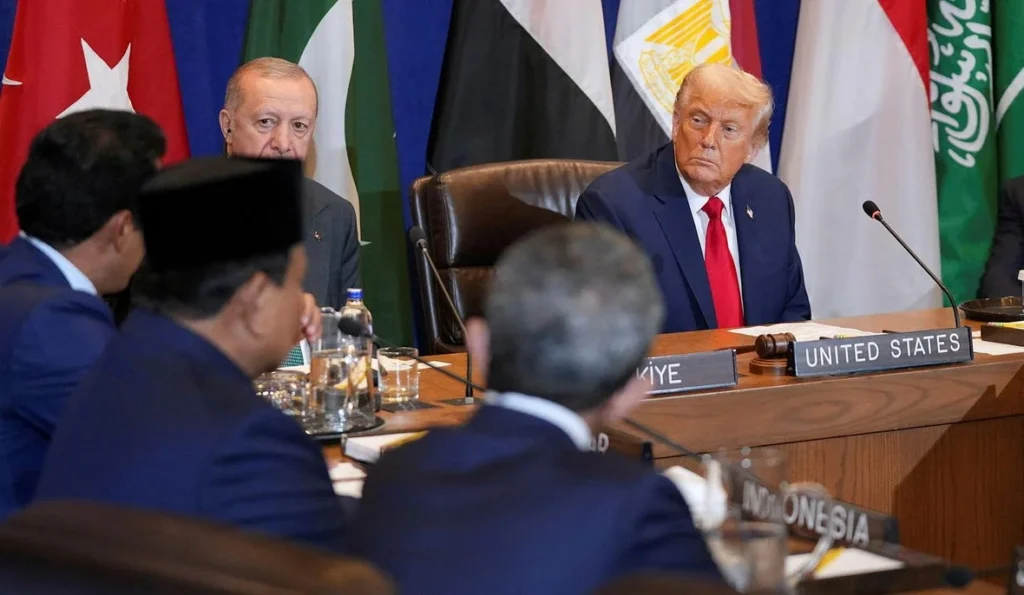Pakistan’s Permanent Mission to the United Nations has welcomed U.S. President Donald Trump’s recent efforts for peace in Gaza, crafted in consultation with eight Muslim members of the OIC, to end the Gaza war. Yet, Islamabad has remained firm on principles: an “unconditional ceasefire” (contrary to the deal proposed in the points plan), the lifting of blockades, and a resolute rejection of annexation plans in either Gaza or the West Bank. Ambassador Asim Iftikhar has underscored that practical, time-bound measures are needed for the implementation of UN Resolution 2334, which deems Israeli settlements in the occupied Palestinian territories illegal, and to safeguard the viability of a two-state solution.
The White House’s 20-point peace plan proposes an immediate end to hostilities, the return of hostages and prisoners, and the establishment of a technocratic transitional administration in Gaza, excluding Hamas from governance. Gaza, under this arrangement, would be redeveloped as a “terror-free zone,” supervised by an international “Board of Peace” chaired by Donald Trump and including figures like former UK Prime Minister Tony Blair. This transitional body would oversee reconstruction until the Palestinian Authority (PA) is ready to assume control.
— The White House (@WhiteHouse) September 29, 2025
The plan has drawn support from Pakistan, Saudi Arabia, Türkiye, Qatar, the UAE, Jordan, Indonesia, and Egypt, signaling a rare moment of alignment among key Muslim-majority states. Prime Minister Shehbaz Sharif publicly endorsed the initiative, posting in favour of President Trump’s 20-point plan. Yet, it has also triggered mixed reactions among Palestinians, regional academics, and observers worldwide.
In Pakistan, critics argue that while the proposal promises immediate humanitarian relief, it falls short of offering a credible pathway to the two-state solution, a cornerstone of Pakistan’s foreign policy. However, rejecting the plan outright could diminish Pakistan’s ability to shape future outcomes or insert safeguards. A more calibrated stance, welcoming the humanitarian reprieve while conditioning support on adherence to the two-state framework, enables Pakistan to remain principled while pragmatic.
Yet, the proposal raises deeper concerns. Unlike the Saudi-French initiative, which envisioned a temporary UN-mandated stabilization mission, this plan sidelines the UN and introduces personalities like Trump and Blair as arbiters of Gaza’s future. It also comes against the backdrop of the U.S. denying visas to PA officials, including President Mahmoud Abbas, for the UNGA session, undermining the very principle of inclusive dialogue. Moreover, the participation of Israeli Prime Minister Benjamin Netanyahu, convicted by the International Court of Justice as a war criminal, calls into question the credibility of negotiations.
Compounding matters, Netanyahu has publicly declared at the UNGA that Israel will never accept a Palestinian state “imposed” after the October 2023 attacks, an explicit rejection of the core demand underpinning international consensus.
Despite these contradictions, one truth remains indisputable: the dire humanitarian need for an immediate ceasefire in Gaza. With thousands of lives at stake, the international community, especially nations sympathetic to the Palestinian cause, cannot afford paralysis. If Hamas, which has yet to formally receive the plan, can be persuaded to engage, and if safeguards for Palestinian sovereignty are secured, this proposal could be shaped into a stepping stone toward broader peace.
For Pakistan, the path forward is clear: balance the urgency of saving lives with the steadfast defense of principle. Ceasefire is the demand of the hour, but peace without justice will remain fragile. Only a sovereign, contiguous, and viable Palestinian state, with Al-Quds Al-Sharif as its capital, can bring durable stability to the region.
Also Read: Pakistan at UNGA 2025: Strong Diplomatic Messaging, Controversy Over Delegation


